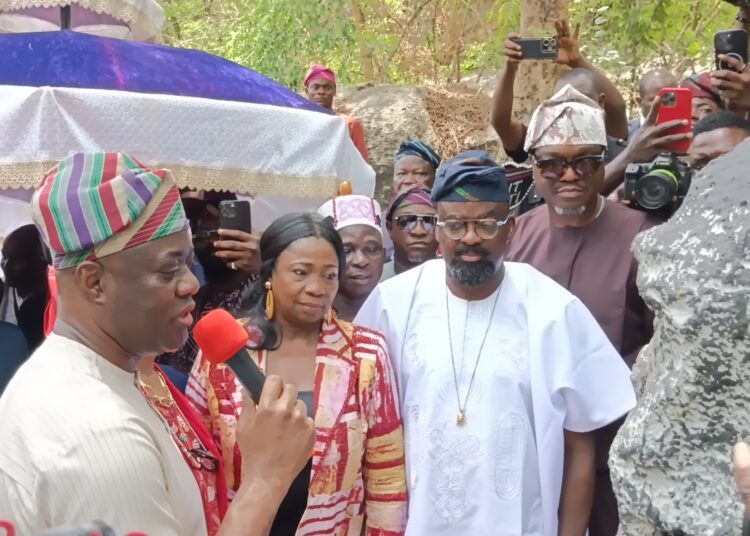OMG! There are governors… and then there are governors in Nigeria.
Some lead with vision, recognizing the immense economic potential embedded in tourism and the creative industry. They invest, support, and build ecosystems that flourish. And then—there are others who don’t give a hoot, treating tourism like an afterthought.
One thing is certain: Kunle Afolayan will never forget the bold day he and his family chose to stake billions of naira—not in Lagos, not in his native Kwara—but in Oyo State. And not even in the urban heart of Ibadan, but in the quiet, rustic, and remote jungle of Igbojaiye—a dry border town tucked far from the spotlight.
It was supposed to be Kunle Afolayan’s defining moment—a glorious culmination of vision, grit, and relentless passion. The world had gathered in Igbojaiye, a quiet, sleepy village in Itesiwaju Local Government Area of Oyo State, to witness the unveiling of a creative marvel: the KAP Film Village and Resort Centre. A dream built at the foot of the hills. A cultural sanctuary envisioned to rival any in the world. But what was meant to be a day entirely about Afolayan’s genius turned into an unforgettable spectacle when Governor Seyi Makinde arrived and flooded the event with promises, plans, and government support that took even the most optimistic guests by surprise.
Over 600 guests had braved the unforgiving roads and long distance to reach Igbojaiye. They came in excitement, full of hope and happiness, ready to witness history. They were drawn by the sheer audacity of a filmmaker erecting a multi-billion-naira creative empire not in Lagos or Abuja, but in a forgotten rural pocket of Oyo State. Guests came from far and wide—government officials, cultural icons, media houses, investors, and art lovers—all eager to experience the birth of a new creative nucleus. The facility, in its rustic yet regal charm, stood majestic, a proud blend of traditional architecture, cultural reverence, and artistic intent. It looked like an oasis in the desert, an entire film village powered, until now, solely by diesel, as Kunle Afolayan revealed in his speech, bearing the burden of running the place singlehandedly.
Afolayan’s voice was steady, but his story stirred the soul. He spoke about the sacrifices, the sleepless nights, the vision of creating something purely African yet globally competitive. Igbojaiye, a village barely known beyond its borders, had now become a destination—thanks to one man’s belief in culture, tourism, and the power of place.
Then came Governor Makinde.
Not one for long speeches, the Governor let his actions speak. Visibly impressed, he praised Afolayan’s courage, calling the investment “monumental and transformational.” And then he began to roll out the unexpected. One after the other, like scenes from a well-scripted drama, came the announcements. He would celebrate his next birthday at the Resort in December. The road from Okaka to Igbojaiye would be fixed. Two transformers would be delivered. A direct power connection from Okaka was to be installed. A mini solar grid would be added. The chairman of the local government was directed to bri h a request for the rehabilitation of the road from Okaka to Igbojaiye to his office on Monday. And just when it seemed he was done, the Governor dropped the final bombshell—an airstrip would be constructed near the Resort, serving both tourism and security purposes.
The crowd gasped.
The applause was thunderous.
The entire atmosphere shifted.
What started as a filmmaker’s private triumph had become a state-backed revolution. It was no longer just about celebrating Afolayan; it was about rewriting the story of rural development, about turning the lens toward forgotten towns and proving that great things can be built outside Nigeria’s urban chaos.
Guests like Minister Hannatu Musawa, Tunde Kelani, Hon. Shina Peller, Abike Dabiri, Dr Abdulazeez Adediran ,Jandor , Abiola Adelana of Sterling Bank, Hon. O’Shine from the House of Reps, Amb. Wale Ojo-Lanre from Ekiti, Akinwale Wolekanle, and others were stunned—not just by the Resort’s scale, but by the Governor’s response. Seun Soyinka had ensured everyone was well hosted, but it was the political gesture of Governor Makinde that sealed the day in gold.
Kunle Afolayan was visibly moved. So were the people of Igbojaiye. The Oba and the townsfolk could hardly contain their joy. Their village was no longer a forgotten dot on the map—it had become the centre of creative tourism in Nigeria.
Makinde didn’t just attend an inauguration. He hijacked it—in the best way possible. He turned a ceremonial launch into a public-private cultural alliance. He saw the potential, felt the pulse, and responded with action.
In the end, the day belonged to both men—Kunle Afolayan, the dreamer who dragged the world to Igbojaiye, and Governor Makinde, the leader who decided the dream was worth supporting. What was built on diesel and determination is now being elevated by vision and power.
And just like that, a new story began—one not only of films and resorts, but of how a small village in Oyo State became the epicentre of Nigeria’s creative future.
Signed
Amb Wale Ojo-Lanre Esq













